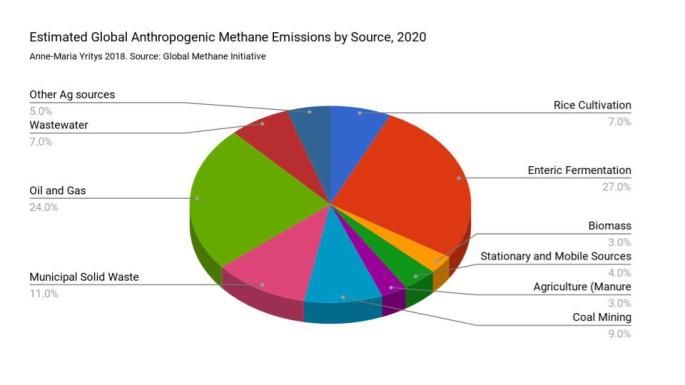The oil/petroleum industry, together with the gas industry, account for a significant 24% of all anthropogenic methane emissions on a global average. In the United States, for instance, natural gas and petroleum systems currently are the cause of 31% of all methane emissions, although there has been a decrease of 16% in total methane emissions in the United States between 1990 and 2015. (Global Methane Initiative 2010; Environmental Protection Agency 2015.)
OPEC, the Organization of the Petroleum Exporting Countries (Algeria, Angola, Ecuador, Equatorial Guinea, Gabon, Iran, Iraq, Kuwait, Libya, Nigeria, Qatar, Saudi Arabia, United Arab Emirates, and Venezuela), recently published World Oil Outlook 2040, a comprehensive analytical report on the current developments in the global petroleum industry and its outlooks for the upcoming two decades, up to 2040. OPEC states in World Oil Outlook 2040 the current major changes and extreme volatility within the oil industry, with OECD commercial oil inventories dropping by more than 50% within less than a year, from the beginning of 2017 up to September 2017. OPEC estimates that sustainable market stability within the industry is necessary to avoid long-term negative consequences for all stakeholders and the overall global economy.
Secretary General of OPEC, Mohammad Sanusi Barkindo, states that all 14 OPEC member countries have signed the Paris Agreement, and recognize the need for energy efficiency and the development of cleaner energy technologies. OPEC estimates global energy demand increasing by 35% from 2015 to 2040, with India and China leading the demand. Moreover, regardless of the rapid average annual growth (6.8%) of renewable energy sources (wind, photovoltaic, solar and geothermal energy), the total share of renewable energy sources is estimated to be rather low yet by 2040 on a global level. While overall global oil demand is projected to increase, oil demand in OECD countries will drop significantly. Total oil demand will slow down in the long-term with the oil industry being challenged by other sources of energy, such as renewables. OPEC also states that advancements in energy efficiency is known to have a central role in emission reduction policies, whereby government policies have a significant impact on the development of energy markets.
The OPEC member countries are identifying energy efficiency and climate change mitigation as a top priority, having signed the Paris Agreement and many of the OPEC member countries investing heavily in renewable energy sources, such as solar and wind. Despite OPEC ́s projections in its World Oil Outlook 2040 for oil accounting for more than half of total energy demand in 2040, estimating that the importance of gas and nuclear will continue to grow regardless of growth in other renewable energy sources such as solar and wind, OPEC identifies a number of uncertainties within the global energy sector, especially in regard to the worldwide oil market. These uncertainties are identified by the OPEC including: pace of technological advancements, including big data, climate change and environmental regulations, policy developments, and economic factors such as costs, fiscal conditions, and speculative financial activities.
Overall, the outlook and future of the worldwide oil industry depends largely upon governmental policies and developments within alternative energy sources, including renewables. Many countries worldwide are investing heavily in renewable energy sources, such as solar and wind energy, having ambitious targets not only to adhere to the Paris Agreement but in fact to take all necessary and possible actions to surpass the average targets of the Paris Agreement. The more efficiently countries are capable of switching over to alternative energy sources, the faster will the demand for petroleum products decreased. This allows for the oil and petroleum industry to continue developing cleaner technologies and investing in improved renewable energy technologies.
Learn more by watching Global Methane Initiative ́s video “Methane Mitigation Matters: Oil and Gas Sector”:
Connect with me on Twitter @annemariayritys. For climate/environment-related posts only @GCCThinkActTank.
Subscribe to my newsletter at https://www.annemariayritys.com to receive my latest articles/posts.
Note from author: I originally published this analysis on my website https://www.annemariayritys.com and on LinkedIn on December 6th, 2017, as part of my research about factors causing anthropogenic climate change and to find out more about the current state and the projections of the global energy sector. My conclusions based on the sources that I used were that despite heavy investments into the renewable sector in many countries worldwide, the need for oil as a source of energy still remains due to a number of reasons, including the fact that when world population continues to grow rapidly, the need for energy increases as well, although a vast part of Sub-Saharan Africa’s population still lives fully without electricity. The expansion of renewables and the usage of traditional energy sources currently go hand in hand. Government policies have a major impact on any country’s energy market. Anne-Maria Yritys, September 2nd, 2019.


